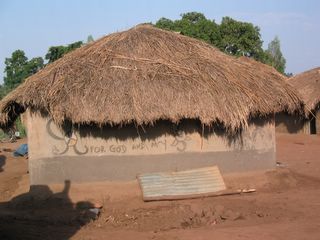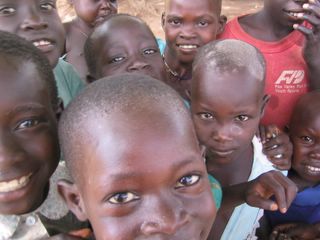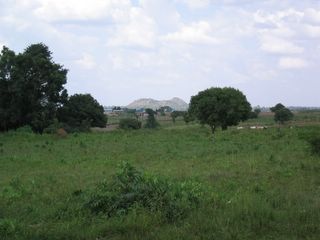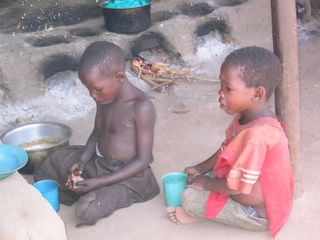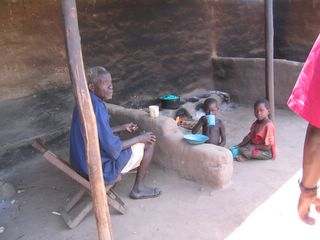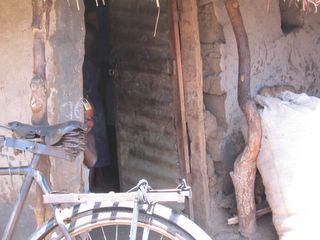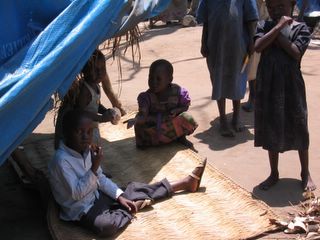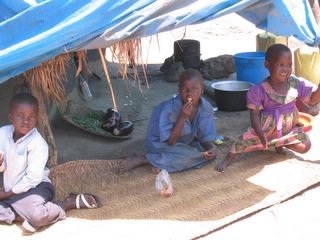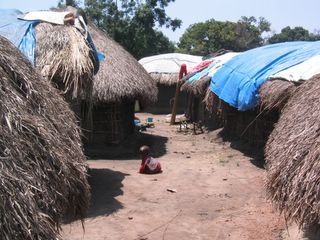I promise I am still here - just working like I've never worked before and without functioning internet in Lira. Now that I am briefly in Kampala I am trying to clean up house.
I am attaching an article below. I usually choose ones that in my opinion shed light on Ugandan affairs, but I am attaching this one because I think it is a highly idealized, blow-up vision of what is happening with Ugandan politics. I assure you, it is not all roses as the following would have you believe, though I do appreciate the point that Uganda's critical political developments are certainly not making headlines in America's newspapers.
REFERENDUM IN UGANDA OFFERS LESSON FOR EMERGING DEMOCRACIES
By Georgie Anne Geyer Tue Aug 2, 8:06 PM ET
WASHINGTON -- Earlier this summer, the leaders of the industrialized world met in Gleneagles, Scotland, and the overwhelming message of this G-8 meeting was Africa, Africa, Africa. If one still believes in the tooth fairy, one could believe that the developed world would indeed finally pay some attention to the troubled "Black Continent."
So it is even more curious -- and disappointing -- that an important recent story illuminating how an African country really develops was virtually ignored in the American press.
I say "virtually" only because I do not pretend to have read every American newspaper to search for some mention of the important referendum in Uganda on July 28. In fact, the only article I saw at all in the seven or eight major papers I searched was in The Financial Times in its July 30/31 weekend edition, titled "Ugandans vote to end 'no party politics.'"
What was so important about a referendum in a remote African country that many Americans barely know, other than the horrendous dictatorship of Idi Amin in the 1970s? The fact is that it represented a necessary, if complicated and dangerous, step for a developing country on the way to development.
First, a little of the relevant history of this potentially rich country smack in the middle of Africa:
After the fall of Idi Amin in 1979, in whose regime at least 800,000 Ugandans were brutally killed, a remarkable man named Yoweri Museveni, a powerful intellectual who had also fought Amin in the guerrilla war, engaged upon a remarkable experiment.
Because his ravaged country had long suffered from a multi-party system that viciously employed religion, ethnicity and region as the sine qua non of each party's interests, he became president 10 years ago under the mantra of "The Movement" or the "National Resistance Movement."
This was the only way, he and his followers believed, to break down the ferocious sectarianism of the political parties that had turned Ugandan against Ugandan, paving the way directly for the poisonous hand of Idi Amin. Under the new system, those hatreds would gradually be ameliorated, then obliterated, as Ugandans ran for office, women as well as men, on merit. The "Big Umbrella," it has also been called.
And the fact is, this experiment in creating a new and inclusive political form to override the decisions of the past has worked brilliantly. The country has come together under the two terms of President Museveni; growth has been steady and fairly distributed, women have had equal access to jobs and the government, and international donors have made the clever Museveni the darling of Western developmentalists.
But "The Movement" has been in place, in one way or another, between 10 and 20 years. Donor nations of the West, still intent upon trying to impose pure Western-style multiparty democracy everywhere, are pressuring Museveni to change the system -- and to give up any idea of running for a third term next year.
So, what to do? For successful presidents such as Museveni, who become heroes to their people and hesitate to give up power for both noble and ignoble reasons, this is a moment of truth in which there is always the possibility of everything being lost.
When I had a lengthy interview with President Museveni in Kampala in May, he spoke of what it was like in the beginning. "You must have a diagnosis. You have a patient, and you are the doctor to treat a sick society. If your diagnosis is correct, then the prescription, which is the vision, is correct. If you don't get that right, it doesn't matter how hard you work. Now our job is to crystallize the vision."
To the surprise of many, Museveni last year himself came out for a change to multiparty democracy. "These are structural issues," he told me. "Our societies are still pre-industrial, which is why we were originally hesitant to have multiparties. But in the last 19 years some evolution has taken place.
"We dissolved the old sectarian groups. Why? Because today everyone has the same social interest. The years have enabled Ugandans to get in touch with one another. There is more self-discipline. There is today a big consensus in the society, and a middle class is emerging . Therefore, we can today face multiparty democracy again."
That was why, on July 28, Uganda did something distinctly different -- but something that could be a model of the kinds of steps needed when countries are in delicate transition. After nearly two decades of what was effectively one-party rule, the country held a referendum on returning to multiparty politics. The president was officially in favor of a "yes" vote. The turnout was disappointing -- only 45 percent of Ugandans voted -- but those who did voted overwhelmingly for the change.
No one knows what President Museveni will do next; he would not comment to me about the many rumors that he would now change the Constitution in order to run for a third term. But here is my informed conjecture:
Museveni will attempt to do what is necessary to run again because he fears the country could still be lost without his leadership. ("Running a country like Uganda is not easy," he was quoted in The Financial Times piece. "It is like driving a trailer on a bad road. You cannot give it to people who are learning to drive.") But he will gain a third term by turning "The Movement" into one party of many and thus win under multiparty rules.
This will not please the purist West, nor will it excuse leaders like Museveni who have done little to groom successors to their reigns. Other Africans are already uneasy about a third term in Uganda because of the practice of many African leaders (the notorious "Big Man" style) to hang onto power indefinitely.
But Museveni is different -- he has been uniquely successful to today's Africa, and fears of his leaving are real.
After all, we have examples from recent history when successful presidents played too precisely by the book and destroyed their countries. One was President Eduardo Frei of Chile, who could have stopped the Marxist Salvador Allende from coming to power in 1970 through congressional manipulations, but who refused to do so and regretted it all his life.
Another was President Romulo Betancourt of Venezuela, who dramatically left the country for Europe in the '60s after two brilliant presidential terms in order to let his people develop without him. But his honorable departure was far too early; in the aftermath of his almost Periclean rule, the country slipped into 30 years of two-party rule so corrupt and avaricious that they gave the region the present dictator/caudillo, Hugo Chavez.
That's why the referendum in Uganda was important. It marked a new attempt, at a crucial juncture of the past and the future, to devise mechanisms to keep people genuinely involved and, at the same time, to sustain the leadership a nation needs.
In fairness, this is actually what the United States and the new Iraqi leadership in Iraq are trying to do. They might well look at Uganda and its leadership for tips.
